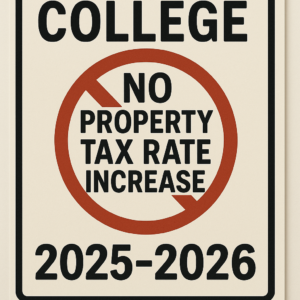 College abandons for now strategy announced at October 2024 meeting that it would increase annual property tax rate by one percentage point
College abandons for now strategy announced at October 2024 meeting that it would increase annual property tax rate by one percentage point
Readers may recall that at its October 2024 District Governing Board meeting, Yavapai Community College (YCC) leadership informed the Board of its plan to adopt an annual strategy of requesting a one percent increase in County property taxes. According to the College, this incremental approach was intended to soften public reaction to periodic tax hikes.
However, within a matter of months, the College appears to have reversed course. At the April 22 Board meeting, Dr. Clint Ewell, Vice President of Finance and Administrative Services, indicated that the College would not seek a property tax rate increase for the 2025–26 budget year.
The reason for this strategic shift remain unclear. Some speculate that the decision may be linked to political considerations, particularly with District 5 Representative Steve Bracety facing re-election in 2026. College-affiliated incumbent Ray Sigafoos lost his seat in 2024, possibly due in part to voter dissatisfaction with his consistent support for tax increases.
Another possible reason is that College leadership recognizes the lack of sufficient support on the Board to pass a property tax rate hike amid the current political climate.
It is noteworthy that at the April meeting Mr. Bracety stated he would not have supported a tax rate increase if one had been proposed, citing recent conversations with business leaders who expressed concern about the economic impact of tariffs on consumers. In that context, he said, a tax rate increase would have been untenable.
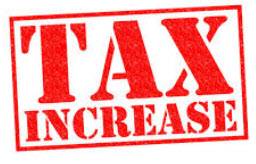 Ray Sigafoos is the longest serving member of the Yavapai Community College District Governing Board with 18 years of service. He is running once again for the position in November.
Ray Sigafoos is the longest serving member of the Yavapai Community College District Governing Board with 18 years of service. He is running once again for the position in November.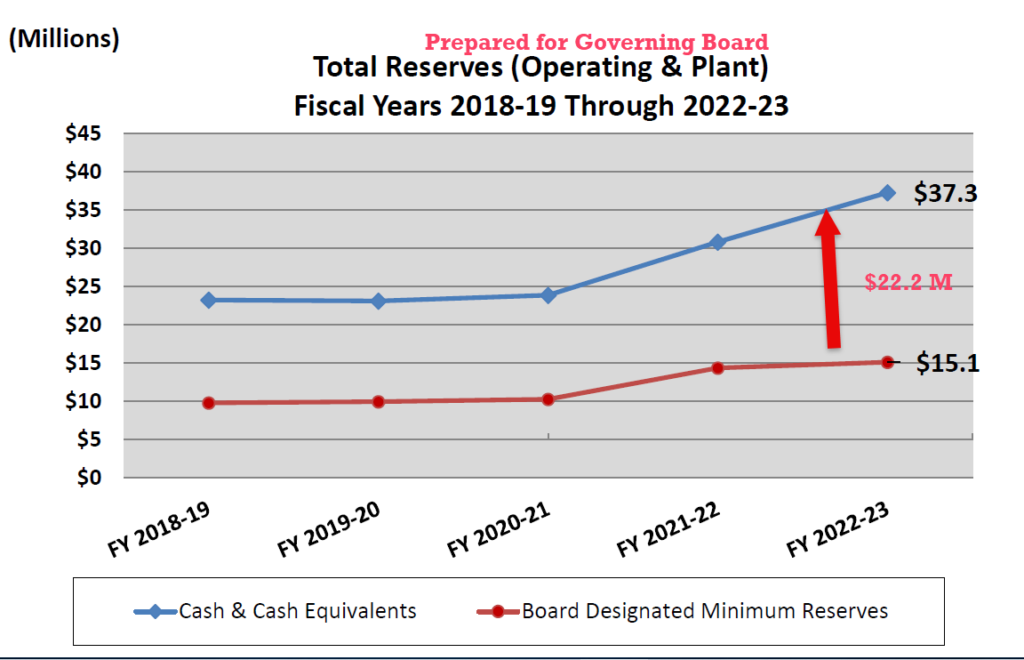
 Yavapai Community College District one candidate William Kiel, while addressing the Governing Board at the May 21, 2024, public tax hearing, was unable to persuade its members to reject the 3.4 percent primary property tax increase it was considering. The property tax rate was approved by a 3-2 vote.
Yavapai Community College District one candidate William Kiel, while addressing the Governing Board at the May 21, 2024, public tax hearing, was unable to persuade its members to reject the 3.4 percent primary property tax increase it was considering. The property tax rate was approved by a 3-2 vote. The Yavapai Community College District Governing Board is receiving significant opposition from Yavapai County residents regarding the proposed 3.4% tax rate increase. The Board will vote on the proposed tax rate increase during its public tax hearing on Tuesday, May 21, at 1:00 p.m. at the Rock House on the Prescott Campus. Here are a few samples from the many emails being sent to the Board of what opponents of the tax increase are saying:
The Yavapai Community College District Governing Board is receiving significant opposition from Yavapai County residents regarding the proposed 3.4% tax rate increase. The Board will vote on the proposed tax rate increase during its public tax hearing on Tuesday, May 21, at 1:00 p.m. at the Rock House on the Prescott Campus. Here are a few samples from the many emails being sent to the Board of what opponents of the tax increase are saying: Yavapai Community College is seeking significant funding from new sources to successfully complete its extensive capital expenditure plan on the west side of Yavapai County. While estimates vary, the College may need as much as $60 million to complete three major capital projects.
Yavapai Community College is seeking significant funding from new sources to successfully complete its extensive capital expenditure plan on the west side of Yavapai County. While estimates vary, the College may need as much as $60 million to complete three major capital projects.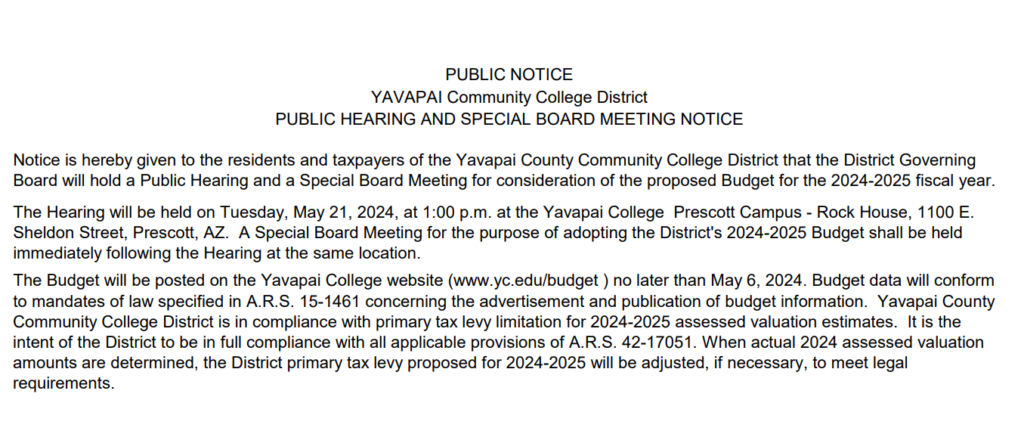
 The Yavapai Community College District Governing Board meeting will be held at the Sedona Campus on Tuesday, March 19. The session will commence promptly at 1:00 p.m. Residents are invited to voice their concerns or opinions to the District Governing Board during the call to the public, typically held at the outset of the meeting.
The Yavapai Community College District Governing Board meeting will be held at the Sedona Campus on Tuesday, March 19. The session will commence promptly at 1:00 p.m. Residents are invited to voice their concerns or opinions to the District Governing Board during the call to the public, typically held at the outset of the meeting.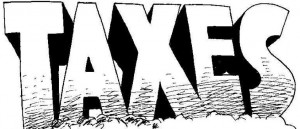 The first method involves the issuance of General Obligation (GO) bonds, a traditional avenue that necessitates a county-wide campaign to explain the necessity for such funds to Yavapai County voters. This approach mandates a transparent explanation of why substantial investments are directed toward certain areas within the County, potentially at the expense of others.
The first method involves the issuance of General Obligation (GO) bonds, a traditional avenue that necessitates a county-wide campaign to explain the necessity for such funds to Yavapai County voters. This approach mandates a transparent explanation of why substantial investments are directed toward certain areas within the County, potentially at the expense of others. Yavapai Community College Vice President of Finance and Administrative Services announced at the November 26 District Governing Board meeting that the administration will ask for a two percent tax rate increase in 2024. The increase is needed, according to Dr. Ewell, to help provide funds for an estimated $3.36 million in additional revenue. If approved, the tax rate increase will add about one-third of the additional revenue the College says it needs.
Yavapai Community College Vice President of Finance and Administrative Services announced at the November 26 District Governing Board meeting that the administration will ask for a two percent tax rate increase in 2024. The increase is needed, according to Dr. Ewell, to help provide funds for an estimated $3.36 million in additional revenue. If approved, the tax rate increase will add about one-third of the additional revenue the College says it needs.